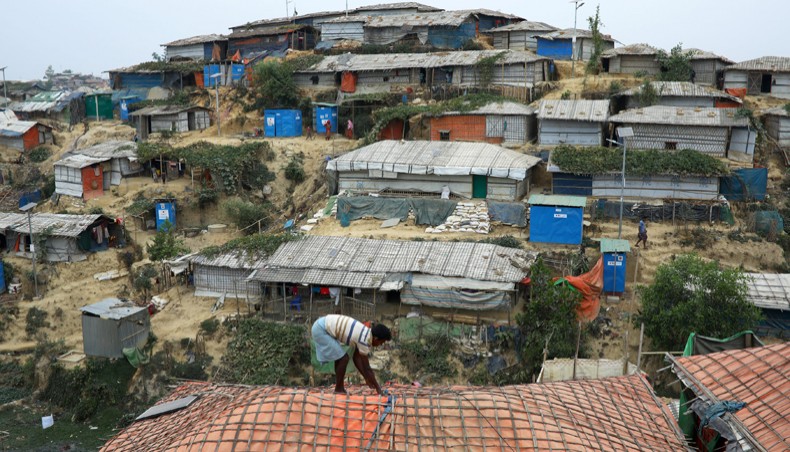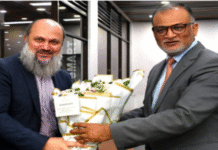
A Bangkok-based rights group said on Tuesday that it had documented indiscriminate attacks on civilians, killings, destruction of civilian homes, and forced displacement during a four-day-long attack by the Myanmar junta beginning January 25 in a predominantly Rohingya-Muslim village in northern Rakhine State along the Bangladesh border.
This attack on the Rohingya has caused fresh concern in Bangladesh, leading to intensified patrolling by border forces to prevent any sort of influx.
Witnesses in Cox’s Bazar said on Tuesday that they heard heavy shelling and firing between dawn and noon along the Whykong border in Teknaf and witnessed a massive cloud of fumes in Rakhine along Anjumanpara, Ukhia, in Cox’s Bazar.
Heavily armed BGB and Coast Guard have been patrolling the bordering river Naf and adjacent area since Monday, while the local administration has suspended the movements of civilian ships since February 10.
The authorities also relocated a hundred Myanmar troops to a safer location to ferry them to Myanmar from two possible dockyards in Teknaf, Cox’s Bazar.
Home minister Asaduzzaman Khan, in a police programme in Dhaka, meanwhile, said on Tuesday that Rohingya or whoever tried to enter Bangladesh would not allow them as long as over a million Rohingya had been living in Bangladesh for years.
He said that the Border Guard Bangladesh, Coast Guard, and police were guarding the border ‘sleeplessly’.
He believed that no civilians would come at this time, and if any, they would be prevented from entering.
Asked, the minister said that the war between the Myanmar force and the Arakan Army inside Myanmar has intensified so much that it forced many Myanmar Border Guard Police, army personnel and others to take shelter in Bangladesh with and without arms to save their lives.
‘Our BGB disarmed them and took them under custody, and the injured were given medical treatment…Myanmar troops would be repatriated within one or two days,’ he said, adding that Bangladesh does not have any ‘conflict’ with them.
At least three officials in Dhaka and Cox’s Bazar told New Age that the Bangladesh Foreign Ministry was in continuous communication with their counterparts in Naypyidaw and instructed the Bangladesh Navy and Coast Guards to facilitate the repatriation by Friday.
Last week, at a high-profile meeting in Dhaka, the Bangladesh authority finalised low-cost deep-sea repatriation after Myanmar had scrapped expensive airlifting.
Witnesses said that the BGB fortified a school compound in the Gumdhum area on Tuesday, when dozens of escaped Myanmar forces were sheltered, limiting the movement of the locals.
Bangkok-based Fortify Rights said that it had documented indiscriminate attacks on civilians, killings, destruction of civilian homes, and forced displacement during a four-day-long attack by the Myanmar junta beginning January 25 in the predominantly Rohingya-Muslim village of Hpon Nyo Leik in northern Rakhine State.
‘These attacks may amount to war crimes,’ it said.
The rights group said that the Myanmar military junta shelled Hpon Nyo Leik village in Buthidaung Township after the ethnic rebel group Arakan Army dug trenches there the previous day.
The four days of shelling by the Myanmar military junta resulted in the killing of 12 civilians and the injury of at least 32, including children, said the rights group adding that all victims were from the Rohingya community.
According to the rights group, the attacks also displaced 15,000 civilians, including children, from Hpon Nyo Leik and the surrounding areas.
Fortify Rights urged all parties engaged in armed conflict in the Myanmar revolution to protect civilians, and member states of the International Criminal Court should refer the situation in the country to the Chief Prosecutor under Article 14 of the Rome Statute.
On January 23, 2020, following the Gambia’s application, the ICJ issued provisional measures against Myanmar to prevent any genocidal acts in its territory against the Rohingyas and to protect them.
Foreign minister Hasan Mahmud on Monday also said he had discussed the Myanmar issue and its spillover effects during his short visit to India, and decided to work jointly as both India and Bangladesh would be affected in case any issue arose in Myanmar.
Some 330 Myanmar Border Guard Police, army personnel, civilian staff, and a few of their family members took shelter in Bangladeshi bordering districts—Bandarban and Cox’s Bazar—between February 4 and 8 amid clashes between the Myanmar military and the ethnic Arakan Army.
Fortify Right, in a statement on February 8, called on the Bangladesh government to investigate newly arrived Myanmar personnel for their possible involvement in crimes and atrocities in Myanmar and coordinate with the International Criminal Court’s ongoing investigation into crimes against Rohingya people.
Asked, home minister Asaduzzaman Khan said that Bangladesh had no list of Myanmar personnel involved in genocide or killing in Rakhine in the past, but the people saw properties burned inside Myanmar.
‘We have seen bodies floating on the river Naf but we are not sure who killed them. We do not have any information. We learned the [Myanmar] army was standing during that time but were unsure they were involved with the acts,’ he said.
New Age









